- Home
- Pat Conroy
The Pat Conroy Cookbook Page 23
The Pat Conroy Cookbook Read online
Page 23
5. Using the palm of your hand, slightly flatten each bun. On a lightly floured work surface, use a rolling pin to roll each bun out into circle about 6 inches in diameter.
6. Heat two large sauté pans over medium heat. When the pans are hot, coat lightly with olive oil (swirling it around for even distribution). Place 2 dough rounds in each pan and cook until the surface of the buns is flecked with light brown spots, 3 to 5 minutes per side. Remove the buns from the pans and keep them warm in a low oven while cooking the remaining buns. Serve hot, passing chutney on the side.
Pork Filling • MAKES ABOUT 2 CUPS
3 tablespoons olive oil
2 red onions, thinly sliced (about 2 cups)
1 pound ground pork shoulder
¾ teaspoon coarse or kosher salt
¾ teaspoon freshly ground black pepper
1. In a large skillet over medium-high heat, heat the olive oil until hot but not smoking. Add the onions and cook without turning until they begin to brown, 5 to 8 minutes. Using a spatula, flip the onions over to brown on the other side, 3 to 5 minutes. The onions should be well colored but not burned.
2. Add the pork and cook, stirring occasionally, until the meat loses its color, 3 to 5 minutes. Add the salt and pepper and let cool. (The filling can be refrigerated for up to 1 day before making the buns.)
ROAST SUCKLING PIG There is no reason for anyone to figure out how to roast a pig on their own when so many people do it so well and are happy to tell you how. This recipe, from Betty Fortson, chef at Bolan Hall Plantation in Beaufort, South Carolina, makes an all-day job seem doable.
• SERVES 10 TO 14
1. First, you need a good butcher. To feed 10 to 14 people, a real suckling pig won’t have enough meat (it might serve 3 or 4). Ask for a baby pig around 30 to 35 pounds. If the pig is too large for the oven, have the butcher cut it in half and either bake the halves in two ovens or bake them one after another if you have only one oven. The butcher must also remove the eyes and break the jaw.
2. Preheat oven to 350° F. Place rack in middle of oven.
3. Once your pig is home, scrub it well inside and out with warm water. Dry, then rub it outside and inside with canola oil. Salt and pepper liberally (inside and out) and add a dash of Accent.
4. Crumple aluminum foil to the size of a small apple and insert in the jaw. Bake for 3 to 4 hours. Test during last hour with a sharp knife. The skin should be crackling crisp. If meat begins to fall apart, stop cooking. Obviously, as pork, the pig must be well done.
5. Insert a small lady apple in the pig’s mouth. Use green grapes for eyes. If the pig is cut in half, place the halves together on a large, parsley-surrounded platter. Cover the cut with large bunches of green grapes. The result should be spectacular.
When I lived in Atlanta during the seventies and eighties, a fetishistic whoop of pleasure would go up along the aisles of the Piggly Wiggly or Kroger or Bi-Lo by wild-eyed aficionados who would let the uninitiated into the secret that the Vidalia onions had arrived in the produce department. I witnessed a pretty Atlanta Junior Leaguer eating a Vidalia onion like an apple as she completed her shopping. A friend of mine would buy a dozen bags of Vidalias on the first day they were available and concoct strange methods to preserve the sweet onions far into the winter months. Once he allowed me access to his cellar and I pulled back at the sight of grotesque, truncated women, until he explained that he used his wife’s ruined panty hose, filled them with the precious Vidalias, and then hung them from the ceiling. “There’s not one onion that is touching another onion. Too much spoilage that way.”
“You like onions a lot more than I do,” I said.
“I like Vidalia onions more than anyone on earth,” he said, his onions hiding but safe in a place where a woman’s legs used to go.
Since those early days in Atlanta, I have become a dedicated advocate of the Vidalia onion. First, let me teach you how to pronounce it because I have seen the word mangled by some of the most famous cooks on earth. It is vie-dale-ya. It is an onion so sweet that you think the fields around Vidalia, Georgia, must be sugary or connected to hives of underground bees. Indeed, they are delicate and subtle and they do not overpower salads or sandwiches. I like to peel them, put them in aluminum foil, hit them with a splash of sesame oil and soy sauce, and grill them over an open fire or throw them in the oven for an hour. They take to my Pickled Shrimp (page 196) with gladness.
The only anti–Vidalia onion fanatic I have ever encountered is my former high school English teacher, Gene Norris. Gene opines (and no one else in the history of the South can make an art form out of opining) this way: “When I want an onion, I want something with kick in it, something that will bite me back, something with some substance to it. I don’t want no sweet onion that’s trying to be more like a potato than a good old onion from my mama’s garden. I want an onion that’s got some sass and backbone to it. Why celebrate an onion that prides itself on not tasting like an onion? Makes no damn sense to me.”
What little opposition the Vidalia onion has received in its triumphant march across the country has come from the unreconstructible Gene Norris. I bought a bag of them in a grocery store in Blue Hill, Maine, this past summer, and I was always pleased when they arrived on California Street when I lived in San Francisco. But what I love most about the Vidalia onion is that it led me straight into the path of the greatest Southern story I have ever heard. I call it the perfect Southern story because all the participants are Southern, because it involves peculiarity, madness, liquor, good high humor, football, snappy dialogue, and more liquor.
My next-door neighbor in Ansley Park was the most fanatical Tennessee football fan I have ever met. When I first moved into the house on Peachtree Circle, I walked out to my office in the back and passed Knox Dobbins washing his car in the driveway we shared. His face was awash with grief, and he leaned against the hood of his car as though he were about to vomit or split open with abdominal pain.
“Are you all right, Knox?” I asked.
“It’s okay. I’ll be fine,” he whispered. “The Volunteers are losing by two touchdowns.”
I nodded in silence and walked up the steps to my office. When I came down an hour later, Knox was on his back in the driveway doing the “dying cockroach” with the spray from the hose hurtling straight up into the air and falling back on him.
“The Vols won it by a field goal,” he shouted.
Later that season, Knox invited me to a football game when Tennessee was playing Georgia in Athens. The only caveat he gave was that we would be forced to sit on the Georgia side because the tickets came from a banker who graduated from the University of Georgia. Knox was worried that he could not sit on his hands for an entire game without rooting for his beloved Vols. That did not turn out to be the major problem of the game.
When I took my seat near the fifty-yard line on the Georgia Bulldog side, a diminutive but formidable lady in her late seventies sat to my immediate left, and she drank from a silver cup filled with ice. She was drinking freely of a brown liquid known as Wild Turkey. She introduced herself and said she’d never seen me, and where was the son of a bitch who usually occupied that seat? I assumed she meant the banker who provided the tickets, but did not know for sure, so I turned and studied the Tennessee lineup with Knox, who had compendious insider knowledge of the entire Volunteer team.
When we rose for the kickoff, I experienced a moment of sheer anxiety when the birdlike woman to my left began to bark like a Georgia bulldog. “Arf, arf, arf, arf, arf, arf, arf!” You get the picture, but it did not let up, so after five minutes I was nearing hysteria as the woman’s barking increased in intensity and volume. She would quit barking only for the several delicious moments when she took a fast swill from her drink and shouted into the sunshine-sweetened air: “Let the big dog drink!”
The barking continued unabated as I became claustrophobic, which began to make breathing difficult. Finally, in desperation, I said, “Madam, do you plan to bark l
ike a bulldog for the entire game?”
She stopped, flashed her ferocious eyes at me, and said, “You’re just like that son of a bitch who usually sits here.”
“Yeah, I can see why it must be a pleasure to surrender those tickets to a stranger.”
“I’ll bet you’re for the goddamn Tennessee Volunteers.”
“I wasn’t when this game began, but I sure am thinking hard about it now,” I said.
She answered me by barking, “Arf, arf, arf, arf, arf,” until halftime, when she mercifully stopped, took a last swallow, and screamed at me, “Let the big dog eat.”
The silence seemed funereal when the woman stopped barking. Then she surprised me by turning friendly. “Hello. Now, son, I’ve got to rest my vocal chords for the second half. So tell me all about yourself. Where you from, honey?”
“Madam, I’m from Beaufort, South Carolina,” I said.
“Beaufort, South Carolina!” she screamed. “I love everything about Beaufort, South Carolina, everything about that pretty little river town. But do you know what I love most about Beaufort?”
“No, ma’am, I don’t.”
“I love to get drunk in Beaufort, South Carolina.” Then she turned to Knox Dobbins and said, “Sweetie pie, where you from, sugar?”
Knox answered, “I’m from Knoxville, Tennessee.”
Again she screamed. “Knoxville, Tennessee? I know everything there is to know about Knoxville, Tennessee. Everything, honey. You know what I love most about Knoxville, Tennessee, the really great thing?”
“No, ma’am, I can’t imagine,” said Knox.
“I love to get drunk in Knoxville, Tennessee.”
There was a pretty young woman sitting next to Knox whom neither of us knew, but who had been dragged into the dance of the bulldog-woman by mere happenstance and the laws of nearness.
“Hey, sweetheart, you look down here, darling. Where are you from, girl?”
“My hometown is Valdosta, Georgia,” the young woman replied.
“Valdosta, Georgia? Now there’s a place to remember. There’s a town you can love. Do you know what I love most about Valdosta, Georgia? The very best thing you can say about Valdosta?”
“No, ma’am, I don’t.”
The older woman paused, took another drink of bourbon, and said, “I love your goddamn onions.”
I told that story once in South Dakota and once in New Hampshire. The audience waited for me to complete the story or get to the point. That’s why I know it is the perfect Southern story—it doesn’t travel well.
FRIED RINGS
Line a baking sheet with brown paper bags and set aside. Thinly slice 2 Vidalia onions crosswise, about ⅛ inch thick. In a large frying pan over medium heat, heat 2 cups peanut oil (or enough oil to come 3 inches up the side of the pan). While the oil is heating, mix 1 cup all-purpose flour with 1 teaspoon sea salt and 1 teaspoon freshly ground black pepper on a plate. Dredge the onion slices in the flour mixture and coat well. Fry the onions in batches (as many as will comfortably fit in pan) until golden brown, about 2 minutes. Using a slotted spoon or tongs, transfer the onion slices to the paper bags to drain. Sprinkle lightly with salt and serve piping hot.
SALAD RINGS
Slice a Vidalia onion and separate into rings. Place in a large bowl and cover with cold water (including a few ice cubes) and 1 tablespoon white wine vinegar. Refrigerate for a couple of hours. Drain the onions, toss with a dressing made from 4 parts olive oil and 1 part white wine vinegar, and season with sea salt and freshly ground black pepper. Serve the salad ice-cold.
RING SANDWICHES
Cut homemade-style country bread into thin slices and spread unsalted butter on one side of each slice. Lay half the bread out, buttered side up, and arrange razor-thin slices of Vidalia onion over the surface. Sprinkle with sea salt and top with another slice of bread, buttered side down. Cut in half and serve.
At the moment I first met Alex Sanders, the mythical and larger-than-life former president of the College of Charleston, it was on a hillside in North Georgia, where he stood holding a brace of live Maine lobsters in a doughnut box while he taught a group of children a magic trick. We were the guests of two ebullient Georgians, Joe and Emily Cummings, on the first of twenty-five annual weekends when a specially selected group of friends would gather for sparkling conversation and superb food. I had always thought I had a good personality until I met Alex Sanders, and I found myself gripped by a kind of autism during that memorable encounter, when Alex dazzled the entire entourage with stories about the South that seemed epic in scope and definitive in nature. That evening, we met at sunset, with the long shadows moving across the hills and the last light sliding across the mountain lake like icing slow to cool.
Emily Cummings, our hostess, pointed toward the disappearing sun and shouted to her musical and talented family, “Oh, look. The sunset. The sheer beauty of the world.”
Her husband, Joe, a wordsmith of great note, added, “By God, this light is a changeling, even a barbaric thing. Thus, this noble orb, engorged with mercury and gold, vanishes even as we speak the name of harsh, demonic night…”
I was new to all this and found it interesting, indeed. Long prepared for these sudden paganlike moments of ecstasy, the four Cummings children, aged eight to eighteen, rushed to their parents’ side and all six of them began humming, tuning, and harmonizing their voices, sounding much like musical instruments warming up in an orchestra pit.
Alex Sanders and his wife, Zoe, watched my reaction to all this with great bemusement. I saw Alex smile as my face turned to pure astonishment when the Cummings family bade farewell to the fast-disappearing sun by bursting into song:
“Day is done, yes, the day is done.
Day is done
Yes, oh Lord, day is done.”
I am not speaking here of a shy, Trappist-like praise of the spilling of time as in Lauds or Matins. It looked like the finale of Show Boat or West Side Story, with everyone singing at the top of their voices, their arms extended, Joe down on one knee, and Emily thrusting an umbrella out toward the mountains and beyond.
Alex Sanders noticed my puzzlement and utter surprise at the suddenness and spontaneity of the scene as the valley rang with the echoes of the hymn.
Then Alex spoke: “Ah! I could not help but notice—this is your first time with the Family von Trapp.”
I fell in love with Alex Sanders that weekend, simply one of the many over the years who have been overwhelmed and ambushed in the field by the sheer immensity of his charm. By a roaring fire on the second day, Alex told some of the greatest stories I had ever heard, and I had to fight the urge to retreat to my room to record them in my journal while their fresh, persimmon-like details still burned along the taste buds of memory. In firelight, Alex had the head of a Javanese tiger and a serenity that enabled him to hold court without resorting to coarseness or testosterone. He waited his turn, then used a matador’s skill in controlling the pace of his narrative, and by changing the rhythm of his great accented voice, he could move us the way the matador could change the direction of a bull’s charge by the flick of the wrist and the false billow created in that acreage of red cape. His phrasing was eloquent, colloquial, his pitch perfect. Wonderful writers surrounded him, and all of them found themselves bested and awed.
I will always remember Alex sitting in his flannel shirt with the smell of burning wood around us as the fires of autumn lit up the ridge of Tate Mountain with the surprising beauty that withering grants to its high forests. Alex’s stories matched the uncommon colors of fall, where the trees flared up in all the vividness of wild roses gone to seed, the wings of hairstreaks and hummingbirds and all the last rainbows of the dying year. Rarely had I encountered stories so original, so strong with delightful detail, so perfect. Like wood smoke, his stories were born of fire, then carried away through air.
Whenever I have been in the presence of Zoe and Alex Sanders, the food has always been fabulous, the company unparalleled, the d
rink free-flowing and plentiful, and the conversation thrilling, heady, life-changing. As a couple, they have turned the dailiness of life into an art form and invited anyone who crosses their path to learn all its steps and secrets. As the College of Charleston knows, the now-retired President and Mrs. Sanders live out their lives at full speed, incapable of holding anything back. Both are fine cooks, and I have eaten like a deposed Italian king when I’ve found myself a lucky guest in their house. Zoe has as inimitable a reputation and mystique as a hostess as her husband does as an orator or storyteller or judge or educator. She is pretty, fiercely competent, fiery in her beliefs, and tenacious in her loves and enthusiasms.
Once, I sat with friends as Alex and Zoe fixed a fish stew that I remember being as good as any bouillabaisse that I ordered in the back-streets of Marseilles. The rouille they composed to top that soup in cloudlike dollops was a lovesong to garlic. I can summon up visions of past meals that have included ice chests loaded down with shrimp that had been swimming offshore that morning; oysters gathered during the last low tide; salads glistening with olive oil and darkened with raindrops of balsamic vinegar; fennel and red peppers blistered on the same grills where marinated flank steaks will follow; quail and wild rice swimming in gravy; sirloin steaks as large as my head hanging off serving platters; grouper and salmon and mahimahi coming off their bones in nuggets of white flesh that tastes like seaborne butter to the palate.
Both Alex Sanders and I have been accused of being prone to grotesque exaggeration in our careers, and there is great merit when that accusation is directed at Alex. But in my own defense, I can never convince people outside the South that I know someone as pointlessly colorful, outrageous, and bone-jarringly amusing as Alex Sanders himself. Alex helped me understand that the South I grew up in is so over-the-top and overbaked that I see myself as a shy minimalist trying to ink black-and-white woodcuts of my native land. Southerners all know that the South is too bizarre and out of control for its own good. I always find myself having to surrender some of the juice, hold back on the cayenne and Tabasco, for the sake of credibility itself.

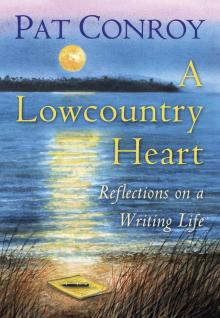 A Lowcountry Heart: Reflections on a Writing Life
A Lowcountry Heart: Reflections on a Writing Life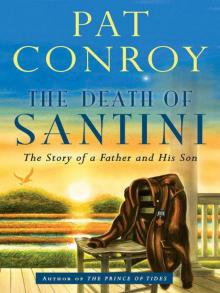 The Death of Santini: The Story of a Father and His Son
The Death of Santini: The Story of a Father and His Son The Boo
The Boo The Prince of Tides
The Prince of Tides Beach Music
Beach Music The Water Is Wide
The Water Is Wide My Losing Season
My Losing Season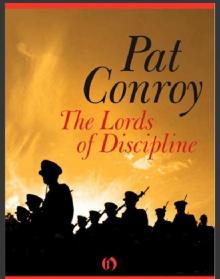 The Lords of Discipline
The Lords of Discipline Pat Conroy Cookbook
Pat Conroy Cookbook My Reading Life
My Reading Life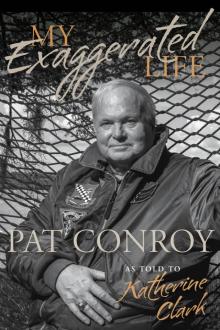 My Exaggerated Life
My Exaggerated Life The Pat Conroy Cookbook
The Pat Conroy Cookbook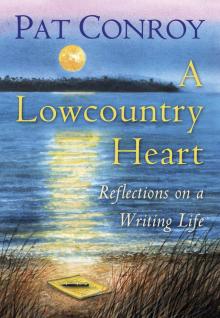 A Lowcountry Heart
A Lowcountry Heart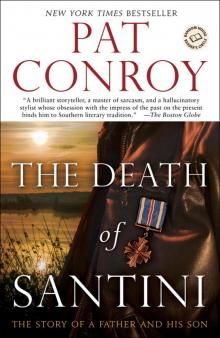 The Death of Santini
The Death of Santini